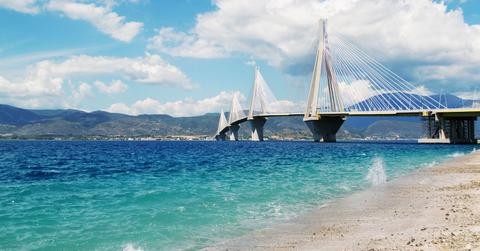Greece Is Campaigning To Remove Plastic Waste From Their Oceans
Most tourists and citizens of Greece are unaware of the awful plastic waste problem that is creating devastation for marine life around their beautiful islands. New goals set by the European Union are forcing people to face the work that needs to be done.
Updated May 23 2019, 8:20 p.m. ET

Most people are unaware of the serious plastic waste issue in Greece that threatens local marine life. According to The Washington Post, a huge part of the problem is that the local government keeps the beaches themselves clean, so tourists and citizens have the issue out of their minds. But it's still damaging the ecosystem under the sparkling blue waters. The Post spoke with volunteer diver George Sarelakos, who drags up garbage from the ocean floor.
“Most beaches are clean because they’re tidied up by municipalities. But the big problem is on the seabed. It’s is like a garbage dump,” Sarelakos said.
He fished out old tires and bundles of rope in front of reporters, adding, “All this is death for sea life. It’s a problem that most people are totally unaware of."
In January, the European Union began to work on reducing plastic across its member states, Greece included. Greece goes through an enormous amount of single-use plastic. They're also recovering from many years of economic difficulties. The EU has set some specific goals—they want no more than 40 plastic bags used per consumer every year by 2025, and for all mass-produced plastic to be recyclable by 2030. In Greece, consumers currently use an average of 296 bags a year per person.
Researchers recently went trawling around the eastern Mediterranean in coastal areas, and the situation was much like the divers describe it. About 95 percent of the trash found was plastic, mostly bottles and bags. Much of that was centered around Athens.
The recycling rate in Greece is also extremely low. The average across the EU is a 44 percent percent recycling rate, but Greece is only at 16 percent. They also are largely powered by coal, and most of their trash dumps are unregulated. Another volunteer diver, Ioanna Kapsimali, also works at one of these landfill sites. She says plastic is a difficult material to manage, even if you're trying to bury it away from the sea. It literally blows away in the wind.
“Plastic is the most difficult material, given its chemical composition,” said Kapsimali. “That happens with quite a large amount (of plastic). It causes problems because the plastic breaks up and is ingested by fish, birds and other animals.”
A charge for single use plastic bags has been instituted, but it's a small piece of the puzzle. A much bigger piece is knowledge—just because the beaches are beautiful doesn't mean human interference isn't wreaking havoc under the surface.